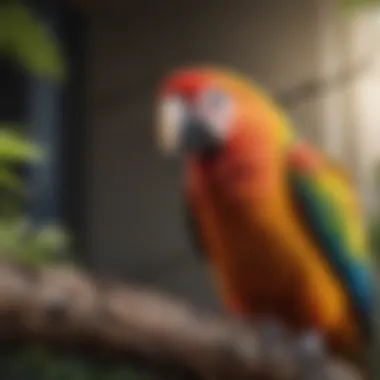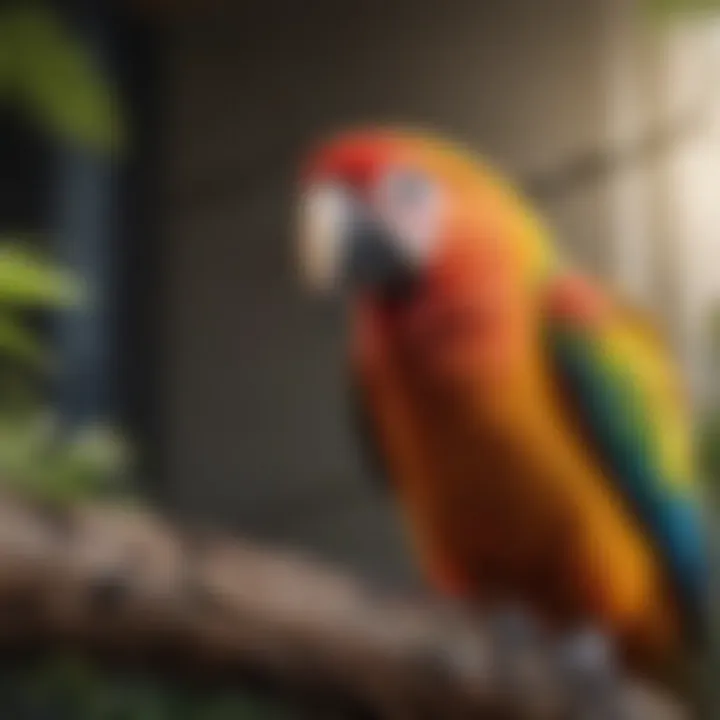Choosing Meaningful Names for Your Pet Birds


Intro
Choosing a name for your pet bird is a significant decision that goes beyond just mere personal preference. The process involves understanding the unique characteristics of your feathered friend, as well as recognizing the emotions and connections that a name imbues. Bird names may reflect cultural aspects, observe behavioral traits, or link with their distinctive colors and personality types. This article aims to provide a comprehensive guide on naming pet birds, offering valuable insights tailored to meet the diverse needs of bird owners, breeders, and enthusiasts alike.
Care Tips
Daily Care Routines
Establishing a daily care routine is crucial to ensure your bird thrives in a secure and hygienic environment. Feeding, social interaction, and exercise should be a part of every hungry morning. Offering fresh food daily, providing clean water, and monitoring their energy levels strengthens both bond and behavior.
Cage Setup and Maintenance
The cage serves not only as a physical space but as part of the bird's identity. Choose sizes that allow them to move freely. Maintain clean space with regular grooming to prevent allergens or germs. A pristine habitat can aid in developing a splendid personality.
Hygiene and Cleaning Practices
Proper hygiene reduces health risks for your bird. Utilize avian-friendly detergents for your cage and areas where the bird spends time. Remember to wash your hands after handling food or cleaning items to prevent introducing contaminants to their sanctuary.
Seasonal Care Adjustments
Seasons can influence a bird's physical needs. For instance, during winter months, ensure the bird's environment remains warm while providing adequate light. Adjust routines as needed, addressing their specific requirements when conditions change.
Behavioral Insights
Understanding Bird Body Language
Being able to interpret your bird's body language is invaluable. Common signs like fluffing feathers may indicate contentment or discomfort. Monitoring their stance can signal their mood, helping to inform appropriate interactions.
Common Behavioral Issues and Solutions
Birds may face challenges with loud vocalizations or destructive tendencies. Addressing these concerns can include providing adequate enrichment, behavioral training, and consulting a veterinarian if behaviors persist.
Positive Reinforcement Techniques
Utilizing positive reinforcement can encourage good behavior in your bird. Techniques include offering tasty treats or allowing extra playtime when they complete desired actions. Building trust enhances lasting and effective relationships.
Social Interaction Needs
Recognize that all birds have distinct social needs. They may require different amounts of interaction to feel satisfied. Providing stimulation through interactions with humans or other birds could make for well-rounded companions.
Nutrition Guides
Essential Diet Components
Bird diets must be carefully balanced to suit their species. Common components include high-quality pellets, fresh vegetables, fruits, and occasional seeds. Monitoring diet closely helps maintain overall health.
Safe and Toxic Foods
Researchers indicate that certain foods could prove toxic. Foods like avocado, chocolate, and caffeine can be harmful. Familiarize yourself with guidelines surrounding safe options, ultimately protecting your avian buddy.
Supplements and Treats
In addition to their basic diet, high-quality supplements like vitamin powders can assist in achieving optimal nutritional intake. Snacks such as nuts can also be a treat that supports enrichment and bonding during training sessions.
Feeding Strategies for Different Species
Bird species each have individualized dietary needs. For example, while parrots may thrive on pelleted diets complemented with fruits, finches often rely on seeds. Engage with avian specialists for tailored advice specific to any diverse pairings you keep.
Wellness and Health
Routine Health Checkups
Regular examinations and checkups can identify health issues before they escalate.


Identifying Symptoms of Illness
Birds can mask health problems. Look for indications like drooping wings, changes in weight, or disappearance of appetite. Detecting symptoms early enhances treatment effectiveness.
Preventative Care and Vaccinations
Keeping a practice of ordinary vaccinations and preventative care ensures long-term health outcomes, locking the protective door against common diseases.
Mental and Emotional Well-being
Just like any animal, birds can suffer mental health challenges. Ensure they have enough interactions and engaging activities to keep their spirits high for happier pets.
Enriching Activities
Toys and Playtime Ideas
Birds require stimulation to nurture their intelligence. Brains need puzzles! Provide toys that challenge them both physically and mentally. Rotate toys regularly for consistent engagement.
Training and Tricks
Birds can learn various tricks responding to specific commands. Use short, manageable tasks and securely aim for enjoying the session. As they acquire new skills, it boosts their confidence and strength of your bonds.
Outdoor Activities and Interaction
Supervised outdoor time allows birds to witness nature and absorb fresh air. Re-evaluating before visits ensures that safety prevails over potential distractions in nature. Allow them the freedom they enjoy alongside protective leashes when necessary.
DIY Projects for Mental Stimulation
Branch out creative energy by constructing funny and engaging crafts for their play. Simple materials can yield astonishingly captivating toys for exploration and play, refining their engagement.
Each segment flushy thru diverse offerings allows you a clearer beam of enlightenment on both ensuring a name and increasing emotional ties toward your avian companions.
Understanding the Importance of Names
Names hold a unique significance in the relationship between humans and their pet birds. This article focuses on various aspects of choosing the right name, which can heavily influence communication, identity, and even cultural perceptions surrounding pet birds. A suitable name can enhance the bond between the owner and the bird, promoting a sense of familiarity. Moreover, it reflects personal preferences and the unique characteristics of the pet. Selecting a name is not merely an aesthetic choice, but an opportunity to express one’s values and beliefs, all while considering the needs of the pet bird.
The Role of Names in Communication
Communication is fundamental in human-animal relationships. The name chosen for a pet bird plays a vital role in how owners interact with their feathered friends. Birds respond to their names, recognizing them as signals that help facilitate engagement. This creates an avenue for better interaction as the bird learns to associate its name with positive experiences, such as treats or playtime.
Additionally, using a name in communication can affect a bird's response behavior. Reacting actively to their name can demonstrate their understanding and adaptability, which supports their cognitive development. Therefore, being mindful about selecting a name that is easy to pronounce can significantly benefit the interaction process.
Names as a Reflection of Identity
A name represents more than just a label; it embodies the identity of the bird and hints at its personality. Choosing a name allows the owner to define their pet’s individuality and nurture the unique traits that it possesses. This name may reflect the bird's character, such as playful or shy tendencies, creating deeper connections.
For instance, a lively parrot may be suited well to a whimsical or energetic name. In contrast, a quieter canary might carry a more serene or elegant name. This reflection of identity can also influence how others perceive the bird, enhancing their personality through effective naming.
Cultural Significance of Pet Bird Names
Bird names can vary significantly across different cultures. This cultural significance means that names can carry particular meanings or associations that shine a light on regional traditions or histories. For example, in some cultures, bird names may be inspired by local folkloric tales or mythology, adding layers of richness to the naming process.
Understanding the cultural implications of a name is essential for the bond formed between the pet and the owner. The right name can signify respect for the cultural background and enhance one’s relationship with the bird. Conversely, using culturally insensitive names can create division or misunderstandings.
Through the lens of this importance, it becomes clear that selecting an appropriate name for a pet bird is more than just aesthetics. It is an act of love that requires thoughtful consideration, touching on various elements that include communication, identity, and culture.
Factors Influencing Name Selection
Choosing the right name for a pet bird is a thoughtful process. A name can affect both the owner's relationship and the bird's identity. Many factors come into play during the naming phase. Each element has its own unique contributions to the final decision. This section explores the critical aspects affecting name selection for pet birds.
Bird Species Characteristics
Different species of birds possess unique traits that can inspire their names. This fact makes species selection an important part of the naming process. For instance, a cockatiel may call for names that reflect playful and sociable behavior. On the other hand, a more reserved species, like a finch, might lead to quieter or more subtle names. Here are some considerations:


- Common traits of the species: behavioral characteristics may suggest different types of names.
- Species origin: names that reflect geographical roots can add cultural richness to the name.
- Notable species features: certain physical traits may prompt particular naming ideas.
Color and Physical Features
Physical appearance holds substantial weight in name selection. The color of a bird, along with other distinct features, can influence choices. Brightly colored birds like macaws may lend themselves to vibrant names, while a more muted-toned bird might suit a soft, gentle name. Factors to keep in mind include:
- Color: names inspired by colors may enhance the owner's bond with their feathery companion. Terms like
Naming Strategies
Selecting the right name for a pet bird requires consideration and strategies beyond preference. Naming strategies guide pet owners in finding a name that resonates with their bird's characteristics and enriching their bond. A thoughtful approach is beneficial, covering several key aspects that fulfill both emotional and communicative purposes. Understanding these strategies ensures that pet parents can choose names that reflect the unique nature of their feathered companions.
Inspired by Nature
Nature offers abundant inspiration when naming pet birds. A name taken from familiar natural elements often resonates with the joy birds bring into a home. For example, naming a bright yellow canary "Sunny" asserts not just a reference to color but also a reflection of the cheerful vibes they emit.
Consider names based on the foliage or environments birds thrive in, such as "Willow" for a gentle bird or "Cedar" modeled after hardy trees. These choices emphasize a connection to the natural world and can provide additional context, essentially linking the bird's essence to its environment. Here are some nature-inspired name ideas:
- River: For a lively bird who loves to fly.
- Cherry: For a vibrant and sweet-natured companion.
- Sky: Well-suited for a free-spirited parrot.
Naming inspired by nature not only enriches the identity of the pet bird but captures the mesmerizing diversity of the environment.
Names from Mythology and Literature
The world of mythology and literature holds rich depths of inspiration for pet bird names. Names drawn from mythic stories carry symbolic value and character depth. For instance, naming a cockatiel "Icarus" brushes the bird with a touch of adventure and warns of ambition. Similarly, selecting Rue from Shakespeare is not just a nod to character but evokes literary poise.
Pet owners can explore various mythologies and literary texts to derive names filled with meaning. This approach connects the bird’s attributes with cultural significations, improving their narrative.
Consider these meaningful names:
- Apollo: Named after the Greek God associated with clarity and brightness.
- Luna: For a bird whose night-colored feathers shimmer under dim light.
- Daisy: Reminiscent of literature’s symbolic representation of innocence and peace.
Names from this realm not only establish identity but enhance the owner’s connection with the bird, developing storytelling capabilities in tandem.
Names Based on Personality
Naming strategies emphasizing a bird's nuances echo the bonds formed with their owners. This personalized connection fosters a deeper understanding of the bird’s needs and quirks. Here are examples based on personality:
- Swiper: For a sneaky but endearing lovebird who loves to sneak up on its owner.
- Bouncer: Recommended for an energetic conure always flitting around.
- Sassy: Perfect for a cockatoo that has a strong personality and doesn't hold back on opinions.
Such names create authenticity, making pet birds feel genuinely part of the family amid shared life experiences.
Naming your pet bird goes beyond aesthetics; it weaves the essence of identity into companionship, enhancing the bond inherently.
Popular Names for Different Bird Species
Naming a pet bird involves consideration of various factors. Popular names for different bird species reflect cultural norms, personal preference, and the pet's unique characteristics. Understanding these trends can significantly enhance both the bird owner's experience and the connection to their feathered friends. Not only do these names often encapsulate traits of specific species, but they also honor the lineage, whether through their natural habitats or cultural stories, providing insight into their behaviors and common traits.
Names for Parakeets
Parakeets, known for their sociable nature and bright plumage, often attract names that match their vibrant personalities. Names like Kiwi, Sunny, and Piper celebrate their playful behavior and diverse colors. Many owners gravitate towards playful names that reflect a parakeet's chirpy clicks. Parakeets communicate energetically, so choosing an engaging name often creates a livelier relationship. Additionally, it is salient to consider the parakeet's preferred activities when selecting names, as their quirks can guide movement towards suitable choices.
Names for Cockatiels
Cockatiels are affectionate and intelligent birds, well-known for their distinctive crests and flirtatious nature. Names such as Coco, Fiji, and Pippin highlight their charming behaviors and responses to interaction. Selected names can represent both the cockatiel's look and personality. Using cute or character-driven names can encourage stronger reactions in these birds. Their flexibility in mimicking sounds can also make everyday expressions an inspiration; say a name often enough, and your cockatiel may learn to associate it with responses.
Names for Lovebirds
Lovebirds are celebrated for their deep bond with owners and interacting with one another. Names reflecting these relationships often include Cupid, Sweetie, and Snuggles. Harmony and connection play an intrinsic part in selecting names, as they mirror the shared experience endured between pet and owner. Individual differences among lovebirds also influence their names. For instance, recognizing a lovebird's favorite activities or distinguishing features often generates names that resonate with personal bonds and unique identities that enrich each owner's life with their lovebird.
Names for Conures
Conures, known for their larger-than-life personalities and raucous calls, often bear fun names such as Mango, Zesty, and Bubbles. Their energetic and comedic nature makes naming them a delightful challenge. Conures distinguish themselves from other birds with their love for attention and interaction, driving owners to select names that encapsulate their humor and spirit. Likewise, the significant range in their vocal abilities each recognize names quickly through toy sounds, which can provide owners actionable insights when considering their conure's names to foster recognition.


In summary, choosing names tailored to specific bird species is essential. This method reinforces identity and connection, allowing owners and birds to thrive in their dynamic relationships. Recognizing personality traits, coupled with species characteristics, ensures selected names resonate with both bird and owner. Names just become part of that ecosystem of communication and affection that exists between humans and their avian companions.
Cultural and Regional Variations in Bird Names
The selection of names for pet birds is deeply influenced by cultural contexts and regional practices. By understanding these variations, bird owners can appreciate the rich tapestry of meanings behind names. This awareness can enhance the connection to their birds and facilitate a more meaningful relationship with them. Names hold significance beyond mere labels; they reflect beliefs, customs, and community ties. Additionally, recognizing global differences in naming practices can open new avenues for creativity when selecting a name.
Common Names Across Cultures
Names for pet birds often have particular meanings in different cultures, and knowing these can be enriching for the owner. For instance, the name "Kiwi" in New Zealand is associated heavily with the country's flightless bird and offers a strong connection to national identity. Similarly, many cultures around the world have specific names for birds based on common traits or symbolic meanings. Names like "Chirpy" can vary in interpretation; for one culture, this might signal happiness, while for another, it might suggest excitement.
- In Hispanic cultures, names like "Perico" for parakeets evoke vibrant imagery of color and playfulness, deeply reflecting the domestic warmth that these birds bring to families.
- The term "Tawny" can apply universally to birds with brown feathering, embodying simplicity and natural beauty.
This richness makes it clear that words in different languages can help convey the unique qualities of each bird, bridging cultural divides. Hence, understanding common names and their ethos gives names a deeper meaning than mere sounds.
Unique Regional Naming Practices
The uniqueness of regional practices plays a vital role in the naming phase. Certain areas may have distinctive bird names that are only recognized locally. For example, in Australia, many petty birds might be named after native flora or fauna, such as "Gumnut" for a small bird with greenish feathers, tightly intertwined with the landscape.
Additionally, pet bird names can also be influenced by local languages, customs, and even folklore. Birds residing in different habitats might relate to place-based terminology, as seen with names like "Flame" for a brilliantly colored canary in Eastern Africa. Each region brings forth a collection of names that embody sweeping cultural histories, heard through the meanings ingrained within.
An understanding of local dialects frequently enhances this process, fostering a personal touch that transcends standard naming methods. This combination of local flavor and linguistic variety results in myriad choices when selecting a name while stimulating familial connections between the species and the individual who cares for it.
Taking time to learn about bird names from different cultures can open new paths for the appreciation of petulture beauty, forging deeper ties.
In summary, exploring and embracing diverse cultural and regional variations in bird names equips owners with more than voice calls; it enriches the emotional and psychological landscapes of bird ownership.
Practical Considerations for Name Selection
Choosing a name for a pet bird goes beyond mere aesthetic preference. Practical considerations play a significant role in ensuring that the name is suitable and functional. This exploration focuses on two major aspects that owners should keep in mind: length and pronunciation, and the importance of minimizing confusion with commands. Choosing right names doesn't just add charm; it can also enhance the overall experience for both the bird and the owner.
Length and Pronunciation
The length of the name is a primary consideration that can impact communication. A shorter name is typically more accessible and easier to say consistently. Names like Rio or Sky can be grasped faster, both by the human speaker and the bird itself. Moreover, many avian species respond better to latency of sounds that are punchy and quick. If a name is excessively long or complex, it becomes cumbersome during daily interactioons.
The pronunciation must also be simple. Names should contain light consonants and clear vowel sounds that do not create ambiguity. An ideal name would be easy for the owner to say repetitively. Possible candidates example include Peep, Finn, or Tango. Each of these names enables comfortable verbalization while maintaining clarity.
Avoid unique spellings unless they result in common pronunciations. Creative variations can complicate pronunciation, rendering communication less effective in routine care or incalculable bonding. The name acts as a primary mode of interaction; thus, choosing one that is not just clever, but also easy to articulate helps establish a robust communication channel with a pet bird.
Avoiding Confusion with Commands
Names should be selected in a manner thatthey do not closely resemble common commands or cues. Birds can be particularly perceptive to sound, and it is essential that their name distinctly differs from standard training commands like come, wait, or no. A name that rings similarly to a command may hinder training efforts or even cause confusion during the pet’s daily routine. This can inadvertently shape the bird’s responses or lead to behavioral challenges down the road.
For example, choosing the name Bobby might lead to miscommunication if you often use Stop! during training or daily indictions. Names that bear phonetic resemblance can result in a blend of signals the bird receives from its owner.
To sidestep such complications, conduct a test with various potential names. Try using them alongside daily commands and ascertain if any resemblance exists. Aim for unique selections that uniquely add a sense of separate identity while enhancing clarification in interactions.
In essence, practicalpt consideration functions as the backbone for fostering effective communication between owner and bird. Length, pronunciation, and distinctiveness are key factors worth weighing.
In summary, when selecting a name for your feathered companion, prioritize brevity and clarity while also avoiding overlap with essential commands. Doing so will create a supportive environment for speech learning and relational bonding, which is fundamentally beneficial for both the pet owner and their companionship.
End on Naming Pet Birds
Naming a pet bird goes beyond mere identification; it establishes the first connection between the owner and their feathered friend. The lasting impact of a name is significant, shaping the bird's experiences and interactions. An apt name resonates not only in the daily life of the bird but also conveys the owner's intent, values, and shared values. This article explored various methodologies for selecting suitable names for pet birds. Readers learned about the various cultural and behavioral considerations that influence the naming process, framing the subject in a manner that enhances perception and understanding of these vibrant creatures.
The Lasting Impact of a Name
Selecting a name signifies the beginning of a relationship. It serves a deeper purpose than simply marking the bird’s identity. A name carries emotional weight. There are instances when pet birds respond to their names, reflecting a degree of understanding and connection with their owners. Names can impact a bird's behavior and emotional state. A bird named in a positive manner may exhibit increased trust and engagement compared to a more neutral name.
Factors that contribute to this lasting impact include:
- Owner's affection: A name reflects the owner's liking or bond with their pet. It positively influences how they interact with each other.
- Social dynamics: The name can become a topic of conversation. It may spark discussions among friends and family, further integrating bird into the community of family and friends.
- Training and Commands: A name chosen for its clarity and distinctiveness can assist in training routines, helping a bird to learn commands more efficiently. Hence, it combines functionality with the emotional essence of a pet, fostering a unique bond.
Encouragement for Individuality
Every bird possesses distinctive traits that can inspire unique names. Owners should embrace the individuality of their pets. This leads not just to a name, but a reflection of the bird's unique nature. Understanding this can enhance bonds after recognition of varied characteristics, such as verbalize or clucking sounds, build relationships with personal lighting hints from the surroundings, or even patterns in daily behaviors.
Process opportunities to affirm each bird's unique charm includes:
- Listening to their behaviors and quirks. A curious or chatty bird could reflect these in its name.
- Considering their colors, shapes and openness. For instance, a vibrant parakeet can pull inspiration from joy or brightness in its coloration.
- Selecting a name as a personalized testament to their history or species attributes.















